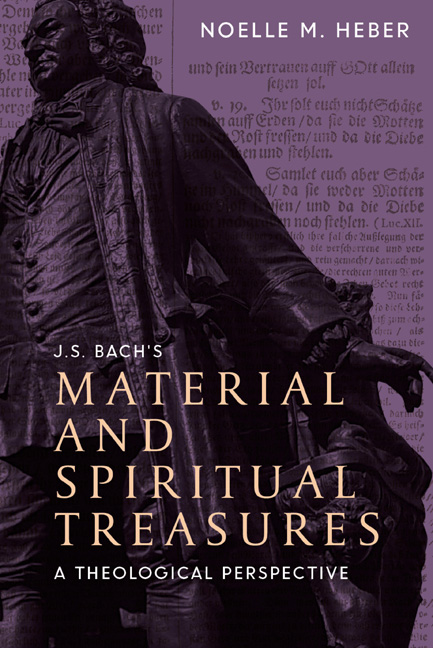Book contents
- Frontmatter
- Dedication
- Contents
- List of Illustrations
- List of Music Examples
- Foreword
- Preface
- List of Abbreviations
- Introduction
- 1 Bach’s Material Treasures: Career, Salary, and Freelancing
- 2 The Servant Prince: Poverty of Christ: Three Days of Christmas (BWV 91, 197a, 248/I, 121, 151)
- 3 Mammon’s Chain: The Destructive and Redemptive Potentials of Material Wealth: Ninth Sunday after Trinity (BWV 105, 94, 168)
- 4 The Afflicted Shall Eat: Tables Are Turned in Eternity: First Sunday after Trinity (BWV 75, 20, 39)
- 5 Spiritual Manna: The Lord Embraces the Poor: Seventh Sunday after Trinity (BWV 186, 187)
- 6 ‘Blood Money’: The Coins that Bought Jesus’ Death: Good Friday (St Matthew Passion)
- 7 Bach’s Spiritual Treasures: Values and Priorities
- Bibliography
- Index of Biblical References
- General Index
1 - Bach’s Material Treasures: Career, Salary, and Freelancing
Published online by Cambridge University Press: 27 March 2021
- Frontmatter
- Dedication
- Contents
- List of Illustrations
- List of Music Examples
- Foreword
- Preface
- List of Abbreviations
- Introduction
- 1 Bach’s Material Treasures: Career, Salary, and Freelancing
- 2 The Servant Prince: Poverty of Christ: Three Days of Christmas (BWV 91, 197a, 248/I, 121, 151)
- 3 Mammon’s Chain: The Destructive and Redemptive Potentials of Material Wealth: Ninth Sunday after Trinity (BWV 105, 94, 168)
- 4 The Afflicted Shall Eat: Tables Are Turned in Eternity: First Sunday after Trinity (BWV 75, 20, 39)
- 5 Spiritual Manna: The Lord Embraces the Poor: Seventh Sunday after Trinity (BWV 186, 187)
- 6 ‘Blood Money’: The Coins that Bought Jesus’ Death: Good Friday (St Matthew Passion)
- 7 Bach’s Spiritual Treasures: Values and Priorities
- Bibliography
- Index of Biblical References
- General Index
Summary
TODAY in Leipzig, a 2.45-metre (8-foot) Bach memorial stands next to the Thomaskirche, where Bach worked as cantor for twenty-seven years (see cover photo). It was sculpted by Carl Seffner (1861–1932) and inaugurated on 17 May 1908. The grandiose monument depicts a confident composer, his left hand just lifted from the organ, a musical score in his right. Curiously, the left pocket of Bach's jacket is turned out and some Leipzig locals inform visitors that the empty pocket indicates that Bach always lacked money. One day, I stepped into the bookstore of the Thomaskirche to inquire about further information concerning this monument and especially the out-turned pocket. ‘I don't know of specific sources,’ the retailer explained. ‘But the pocket is turned out because Bach always lacked money to provide for his large family. This is commonly known.’ Just having completed an investigation into the extent of Bach's earnings, especially in Leipzig, I found this reaction to be perplexing. Modern biographies do not paint such a penurious portrait of Bach, so why, at least locally in Leipzig, would people today hold such an opinion?
The programme notes for the first Bach-Fest in Leipzig, which coincided with the inauguration of this memorial (16–18 May 1908), cite two contemporary ‘great works’ on Bach as trustworthy scholarly sources: Albert Schweitzer's J. S. Bach (1908) and Andre Pirro's L’esthetiqué de Jean Sebastian Bach (1907). The programme notes encourage readers to turn to these accounts for current research on the composer instead of succumbing to the perspective of him that had emerged during the Romantic era. While this book by Pirro focuses on aesthetics in Bach's music, he had published another book in 1906 with more commentary on Bach's life. The pages that describe Bach's tenure in Leipzig highlight conflicts around money with the authorities and Bach's discontentment there. Schweitzer discusses similar circumstances in his biography, but summarises Bach's financial situation as follows:
On the whole, however, Bach's income, if we take into consideration the value of money at that time, cannot have been a poor one.
- Type
- Chapter
- Information
- J. S. Bach's Material and Spiritual TreasuresA Theological Perspective, pp. 15 - 62Publisher: Boydell & BrewerPrint publication year: 2021



